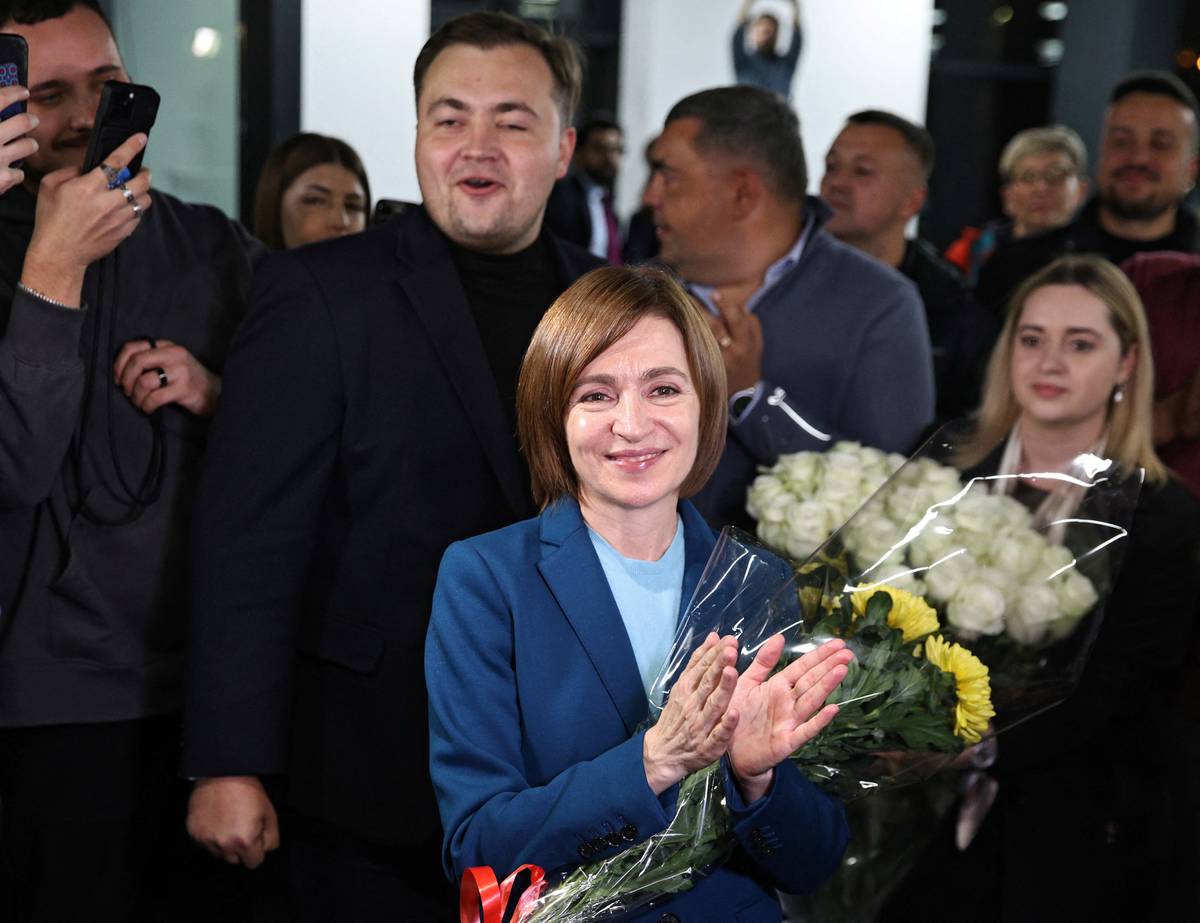
Moldova’s incumbent President and presidential candidate Maia Sandu celebrates with supporters following the announcement of the preliminary results of the second round of the presidential election, at her campaign headquarters in Chisinau, Moldova November 3, 2024.
13:54 JST, November 4, 2024
CHISINAU (Reuters) – Moldova’s pro-Western incumbent Maia Sandu claimed victory at Sunday’s closely-fought presidential election, defeating Alexandr Stoianoglo, her rival backed by the traditionally pro-Russian Socialist Party.
With 98% of the ballots counted, Sandu led Stoianoglo with 54.35%, the Central Election Commission said at the end of an election and campaign that were marred by persistent allegations of interference denied by Russia.
The victory for the 52-year-old ex-World Bank adviser, who has accelerated the nation’s push to leave Moscow’s orbit and join the European Union, is seen by her supporters as an endorsement of the resolutely pro-Western course she has tacked.
But Stoianoglo’s dominance across swathes of the country suggests her party faces a stiff challenge at key parliamentary elections next summer that will decide the composition of the government.
Stoianoglo campaigned saying he supported EU integration, but that he also wanted to develop ties with Russia in the national interest. Sandu portrayed him as a Trojan horse for the Kremlin’s interests, something he denied.
The future of Moldova, a poor agricultural nation that has alternated between pro-Russian and pro-Western courses since the 1991 Soviet breakup, has been in the spotlight since Russia began its full-scale invasion of neighbouring Ukraine in 2022.
The vote was closely watched in Brussels a week after Georgia, another ex-Soviet state seeking membership, re-elected a ruling party regarded in the West as increasingly pro-Russian.
“Moldova, you are victorious! … In our choice for a dignified future, no one lost,” Sandu said in a conciliatory victory speech, in which she said she had to address the concerns of those who voted against her.
“I have heard your voice – both those who supported me and those who voted for Mr. Stoianoglo. I commit to being the president for all of you,” she said.
The vote marked the largest number of expatriate voters to take part in a Moldovan election since 2010 when the diaspora was first allowed to vote.
Inside Moldova’s borders, the results showed Sandu actually lost the election to Stoianoglo by a small margin of 48.8% versus his 51.2%. By contrast, she looked on course to win more than 80% of the diaspora vote, which was still being counted.
“The increased turnout in the diaspora paid off. It changed the balance of power,” said Ruslan Rokhov, a Ukrainian political analyst focused on Moldova.
ELECTION MEDDLING CLAIMS
Sandu’s national security adviser Stanislav Secrieru accused Russia on Sunday of massive interference, the latest in a series of allegations also levelled at fugitive oligarch Ilan Shor who lives in Russia and denies wrongdoing.
“We’re seeing massive interference by Russia in our electoral process … an effort with high potential to distort the outcome,” Secrieru wrote on X on Sunday.
There was no immediate comment from Moscow, which has repeatedly denied allegations of meddling.
Secrieru cited reports of voters being taken to polling stations, cyberattacks and bomb hoaxes reported at overseas polling stations in Europe.
The police cracked down to try to avoid a repeat of what they said was a vast vote-buying scheme deployed by Shor in the first round and a referendum on the EU’s aspirations that was held the same day.
Sandu has said the meddling affected the Oct. 20 first round and that Shor sought to buy the votes of 300,000 people, more than 10% of the population. The referendum delivered a slender win of 50.35% for the pro-EU camp.
Stoianoglo’s East-West balancing rhetoric contrasted with Sandu’s four years in power, during which ties with the Kremlin have unravelled, Moscow’s diplomats have been expelled and she has condemned Russia’s invasion of Ukraine. Moscow calls her government “Russophobic”.
Sandu painted Sunday’s vote as a choice between a bright future in the EU by 2030 or one of uncertainty and instability.
Stoianoglo said that was untrue and that Sandu had failed to look out for the interests of ordinary Moldovans. He accused her of divisive politics in a country that has a Romanian-speaking majority and large Russian-speaking minority.
Stoianoglo benefited from protest votes against Sandu’s handling of the economy.
Moldova struggled with the aftermath of the COVID pandemic and the effects of Russia’s Ukraine invasion, which sparked a huge influx of refugees and sharply reduced Russian gas supplies, causing high inflation.
“I want you to know – I have heard all voices, including the critical ones. And I thank you for looking past grievances, past dissatisfactions, to protect our country,” she said.
Top Articles in News Services
-

Survey Shows False Election Info Perceived as True
-

Prudential Life Expected to Face Inspection over Fraud
-

Hong Kong Ex-Publisher Jimmy Lai’s Sentence Raises International Outcry as China Defends It
-

Japan’s Nikkei Stock Average Touches 58,000 as Yen, Jgbs Rally on Election Fallout (UPDATE 1)
-

Trump Names Former Federal Reserve Governor Warsh as the Next Fed Chair, Replacing Powell
JN ACCESS RANKING
-

Japan PM Takaichi’s Cabinet Resigns en Masse
-

Japan Institute to Use Domestic Commercial Optical Lattice Clock to Set Japan Standard Time
-

Israeli Ambassador to Japan Speaks about Japan’s Role in the Reconstruction of Gaza
-

Man Infected with Measles Reportedly Dined at Restaurant in Tokyo Station
-

Videos Plagiarized, Reposted with False Subtitles Claiming ‘Ryukyu Belongs to China’; Anti-China False Information Also Posted in Japan























